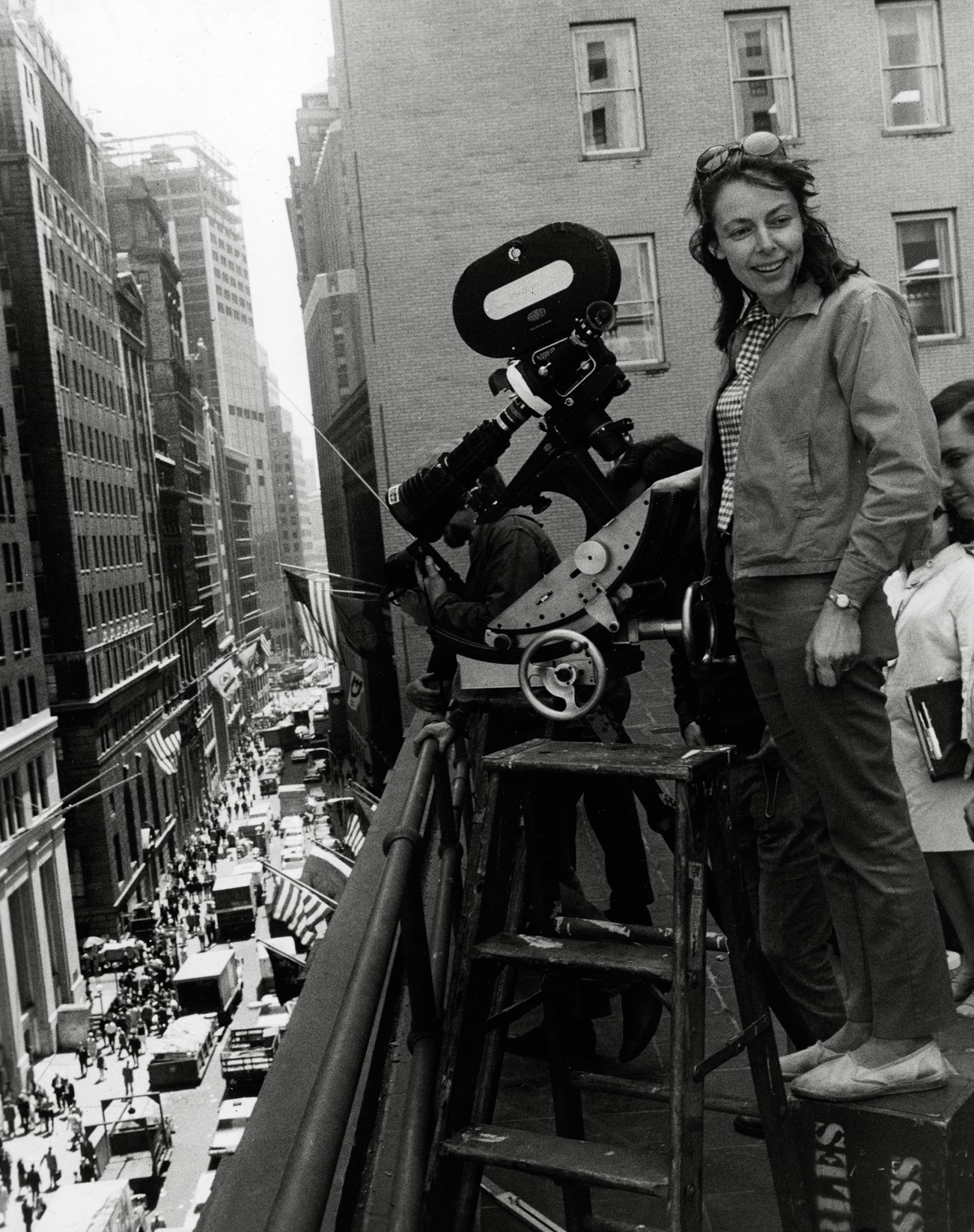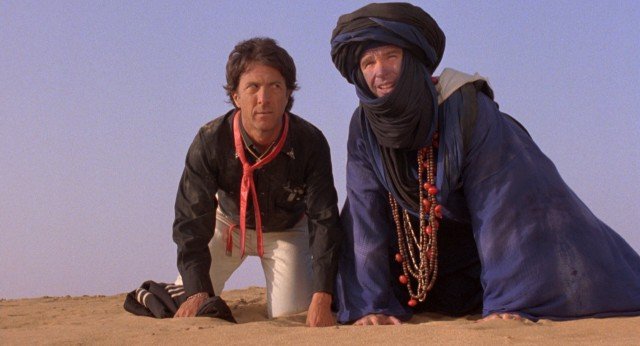Recent Articles
FOUR WEEKS OF MAY: ISHTAR
We’ve arrived at the end of Elaine May Month, with one of the most infamous debacles in Hollywood history, ISHTAR. Does the movie deserve its ragged reputation?
It seems like once every decade or so, there’s a major motion picture that ends up making such questionable creative decisions, weathering such tremendous behind-the-scenes drama, and enduring so much negative press that they become “Worst Movie Ever” contenders almost immediately upon release. In the 90’s, it was probably Rob Reiner's famous debacle NORTH. In the 2000’s, you couldn’t avoid hearing a joke about Ben Affleck’s GIGLI . And I’m willing to bet most people heard about the disaster that was 2016’s SUICIDE SQUAD long before they ever got around to seeing it, if they ever did at all.
The funny thing about those once-every-ten-years catastrophes is that those Worst Movie Ever tags eventually start to feel like foregone conclusions, rather than something the movie in question truly earned, an end result of press outlets needing a final punchline to the film they had spent months trashing. That is to say, it wouldn’t be very satisfying to roast BATTLEFIELD EARTH and then have it come out and be just mediocre, would it?
Well, in the case of BATTLEFIELD EARTH and stuff like SUICIDE SQUAD, the moniker ended up being apt. But for some of these others? They’re usually not great, but calling something the “Worst Movie Ever” before it’s even released is usually writing a check the movie can’t actually cash.
We also live in an era where movies that were initially critically derided and financially ignored wind up eventually getting revisited and often championed by future cinephiles. Off the top of my head, a short list of movies I’ve seen get reclaimed over the years include SPIDER-MAN 3, JINGLE ALL THE WAY, STAR WARS: EPISODES 1-3, THE VILLAGE, POPEYE…and ISHTAR.
Ah, yes, ISHTAR, the movie that seemed to symbolize Hollywood failure more than any other when I was a kid. It felt like I heard it referenced a lot; I have a very specific memory of an Animaniacs episode set in a video store where a VHS copy of Elaine May’s final directorial effort was dropped to the floor, causing a nuclear explosion offscreen. Of course, I had never actually seen it; by the time I was old enough to have heard of it, it was almost ten years old. And the idea of watching a movie starring two men in their fifties wandering around in the desert didn’t sound that exciting to adolescent me.
But, as it happens, I have now seen ISHTAR, thanks to this self-imposed Elaine May marathon I’ve now completed. I find myself at a crossroads, trapped between two generation of cinematic evaluation. Is ISHTAR indeed an excessive unfunny attempt at comedy? Or is it in fact an under-appreciated romp?
In order to close out Elaine May Month, let’s find out!
ISHTAR
Directed by: Elaine May
Starring: Warren Beatty, Dustin Hoffman, Isabelle Adjani, Charles Grodin
Written by: Elaine May
Released: May 15, 1987
Length: 107 minutes
ISHTAR is the story of two very bad songwriters, Chuck Clarke (Hoffman) and Lyle Rogers (Beatty) that both manage to find each other and proceed to write terrible songs together in order to pursue their ambitions of becoming a famous singing duo. In an effort to scrape up work for them, their agent Marty Freed (Jack Weston) books them a gig in a Marrakesh hotel; as it happens, there’s an opening in the lineup due to recent political unrest. With nowhere else to turn, Chuck and Lyle head to Morocco.
Their flight takes them as far as neighboring Ishtar, where Chuck runs into a mysterious, desperate woman who claims her life is in danger and needs his passport. His decision to do so sets off a chain of events that takes us to the end of the film. Chuck and Lyle end up entangling themselves with the CIA, and find themselves in the middle of a complicated scheme to unseat the current Emir of Ishtar. Secret identities, double-crosses and good times with weapons ensue.
This complicated, yet simple, plot was meant to be an intentional riff by May on the old Bing Crosby-Bob Hope ROAD TO… vehicles, where the two stars usually played silver-tongued conmen who find themselves tossed around to faraway lands, and typically tended to be meta-riffs on popular genres of the time (desert adventure or jungle films, for instance). In a meeting with Beatty, May pitched her idea of doing a variant on that old series, set in the Middle East and starring Beatty.
I found Beatty’s appearance in this movie curious, since it didn’t seem like his kind of role, bordering on miscasting. It turns out that he was returning a favor to May, who had done extensive uncredited rewrites on REDS, as well as being the co-writer on the script for HEAVEN CAN WAIT. He decided to move forward with ISHTAR after he believed himself capable of providing the kind of protection May never had between her set and her studio.
Hoffman wasn’t as easily sold. As it turns out, his initial involvement was also as a result of a movie May had done uncredited rewrites on, 1982’s TOOTSIE. After eventually turning down ISHTAR, he’d go on to give May another shot, and met with her and brought along his creative consultant, playwright Murray Schisgal. They both felt that the movie shouldn’t leave the initial New York setting, believing the Morrocan stuff to overwhelm the rest of the film. Although he was hesitant, Hoffman ended up only doing the film after Beatty convinced him May would make it work.
In a fashion sadly typical of Elaine May films, the shoot quickly became chaotic. Columbia already had quick trigger fingers due to May’s reputation from MIKEY AND NICKEY for shooting much more film than is typically needed.
Many of ISHTAR’s behind the scenes issues were beyond their control. The decision was made to shoot the majority of the film in the actual Sahara Desert, and principal photography began just as Israel began bombing Palestine; the infamous murder of Leon Klinghoffer soon followed. Talk about your bad timing. There were also issues stemming from cultural differences between the American film crew and the Moroccan locals; there’s an infamous (possibly untrue?) story about one of the animal trainers dragging his feet on purchasing a blue-eyed camel, only to find out the camel was eventually eaten by its owner. Also, Morocco understandably didn’t really have the infrastructure to support a Hollywood film crew, and thus were unable to fulfill many requests and obligations.
Finally, Elaine herself seemed uncomfortable in the desert setting, and ended up fighting with people constantly. Some of her targets included: Warren Beatty, her cinematographer Vittorio Storaro, Warren Beatty, her editing crew, and Warren Beatty. Seriously, May and Beatty fucking hated each other by the end of this thing. Beatty felt like he was stuck on this shoot that was spiraling out of control because he had been doing it as a favor to a friend, yet he found himself disagreeing with May on almost everything. The budget ballooned, the release dates were delayed, and a public catastrophe was born.
As they often say, the story of what went wrong is twice as interesting as the product on-screen. The interesting and fraught friendship between Beatty and May takes this tragic arc that someone is almost definitely try to dramatize in a terrible prestige miniseries eventually. Maybe the people who brought us THE OFFER can take it on.
Well, enough about what went wrong behind the scenes. Was it all worth it? Was the initial dog-piling on this movie fair? What’s the tale of the tape?
Well, I regret to report that I didn’t like ISHTAR very much. I certainly don’t think it belongs on the Worst Movies Ever list; I’m not even sure it registers on the scale. But it is easily the least of May’s four directorial efforts and a strange misfire coming from someone who had such success at trying different genres and styles of films.
I didn’t go in wanting to hate it. I really did want to join the throngs that have sung the movie’s praises in recent years. But it turns out that I couldn’t, and it’s for one specific, overriding issue.
ISHTAR’s primary sin is that it just isn’t very funny.
There are moments here and there; I think the Paul Williams-penned songs succeed in their intentional ineptitude, and I greatly enjoyed how each Rogers and Clarke song is usually just a half-syllable off in meter, which causes it to hit the ear so badly. It’s also always welcome to give Charles Grodin a few moments to do his Grodin thing (although not nearly enough).
Finally, and crucially, I generally actually liked the characters of Rogers and Clarke. The way that they’re set up in the opening minutes (two inept songwriters who find each other almost by accident and end up losing their lives and savings as a result of their misfired ambitions), it seemed like a different movie entirely was in store. They’re broadly funny without feeling unmoored from reality. I would have been perfectly content if they had just stayed in New York and try to make it big (in this and this alone, Hoffman and I share some common ground).
Alas, we’re out of the United States by the twenty minute or so mark, and we arrive in the fictional Ishtar, on their way to Morocco to head to their first paid gig. Comedic hijinks ensue and they almost all fall flat onscreen. I can’t quite put my finger on why nothing seems to work, but work they do not.
I keep thinking about how Elaine May meant for this to be a tribute to the ROAD TO movies, a noble pursuit that somehow seems to have gotten lost somewhere down the line. I’m not the world’s foremost expert on those Hope and Crosby vehicles, but I can say that the best of the ones I’ve seen, ROAD TO MOROCCO, stood out from the others due to its actually quite catchy tunes and its wildly playful sense of humor; Hope and Crosby continuously make jokes about themselves as people, including their contract status at Paramount and their desire for Academy Awards. It’s a blatant break in character, but the actual characters don’t really matter in ROAD TO… films. Nor do the plots, as they’re usually merely flimsy excuses to get the pair into the next set-piece, usually involving Dorothy Lamour (Hope and Crosby usually comment on the thinness of the plots as well).
ISHTAR seems to have landed on the opposite philosophy, working very hard to establish Hoffman and Beatty’s characters (to some significant degree of success, as mentioned above) as well as an increasingly complicated plot. None of the trademark playfulness that one might expect from a ROAD TO riff is present here. It’s a little surprising to me that May replaced that with spectacle (that being said, Dustin Hoffman DOES fire off a rocket launcher in this, which is something), since her improvisation background would seem to be a great fit for that comedy style.
As a result, I find myself unable to reclaim ISHTAR as a slept-on classic. Instead, it’s merely a sad end to a far-too-small directorial body of work from one of the funniest people on the planet. It shouldn’t surprise anyone that Elaine May never directed anything else again. However, her legacy is definitely secure, having just this year received an honorary Oscar. She has a resume full of creative credentials longer than just about any other living person in Hollywood.
I don’t blame her for not returning to the director’s chair. Would you?

Best of
Top Bags of 2019
This is a brief description of your featured post.
Subscribe to our newsletter.
Sign up with your email address to receive news and updates.












